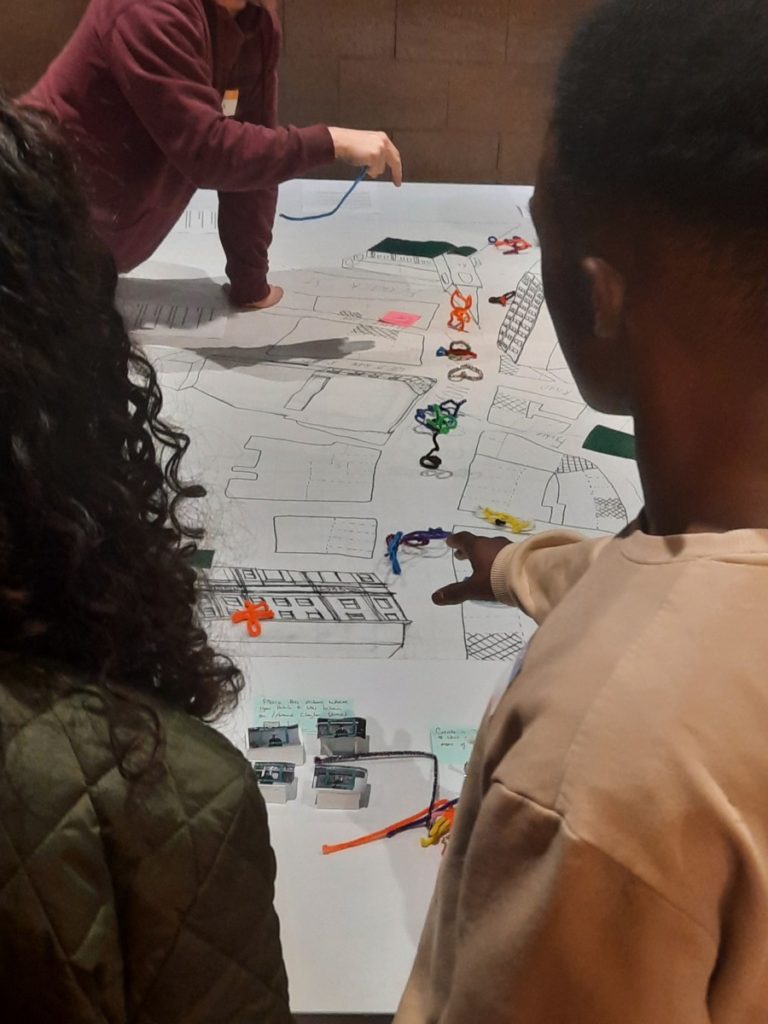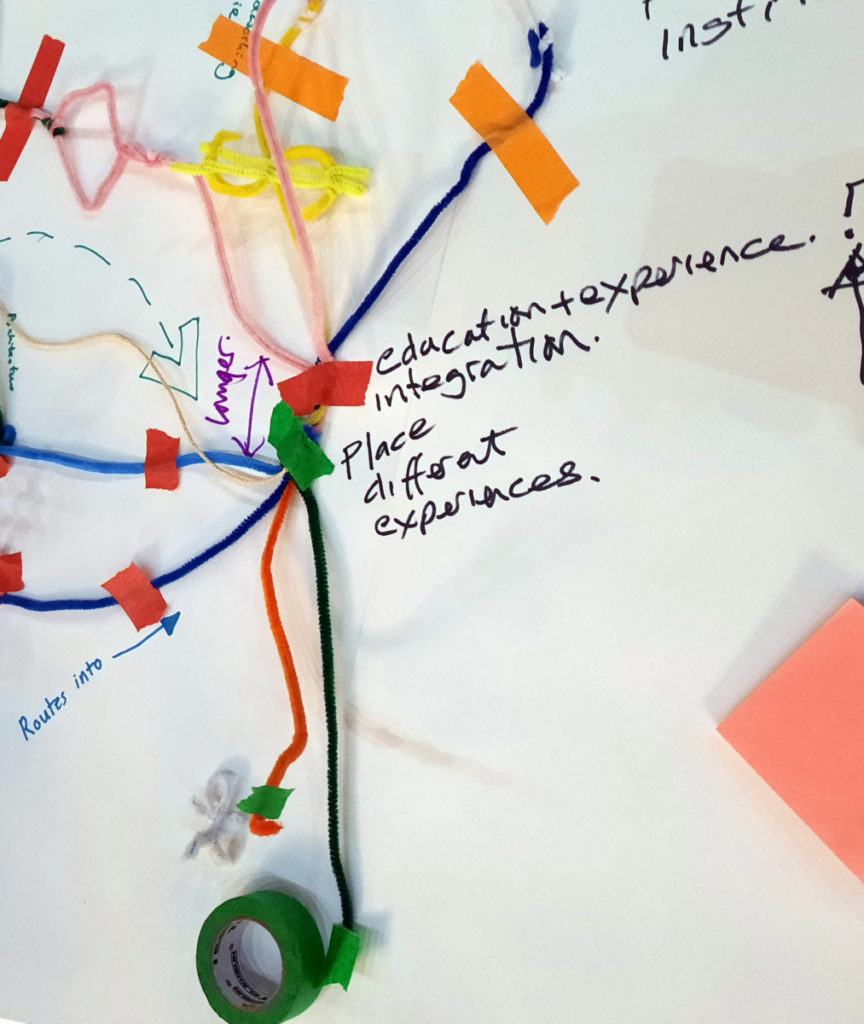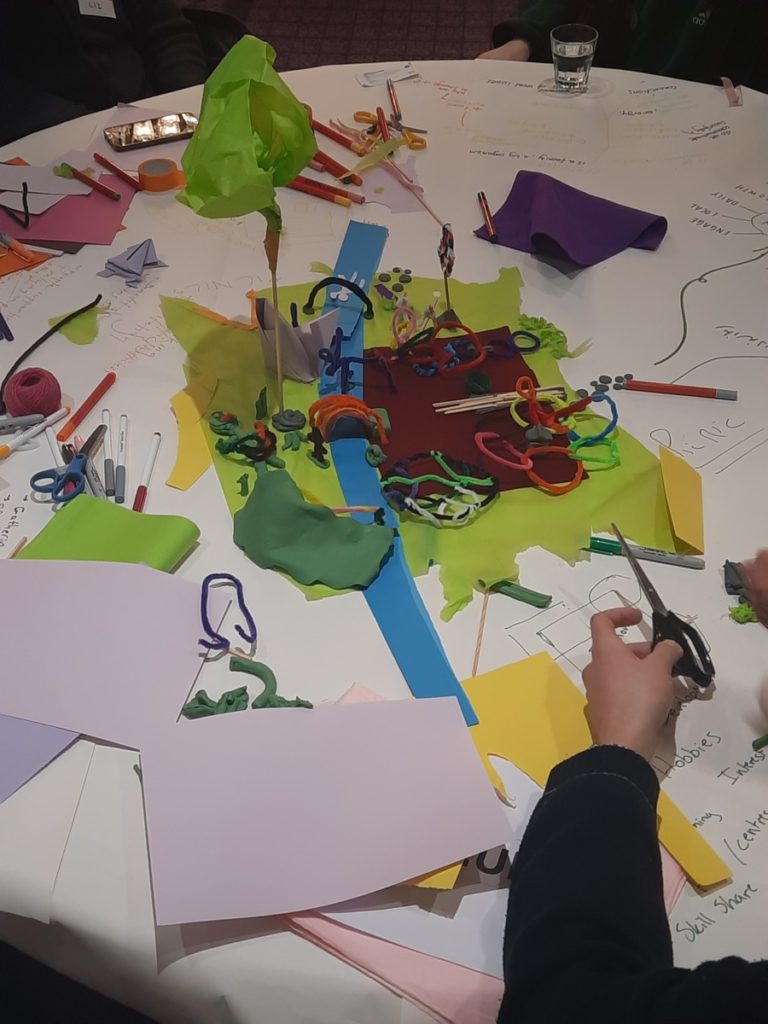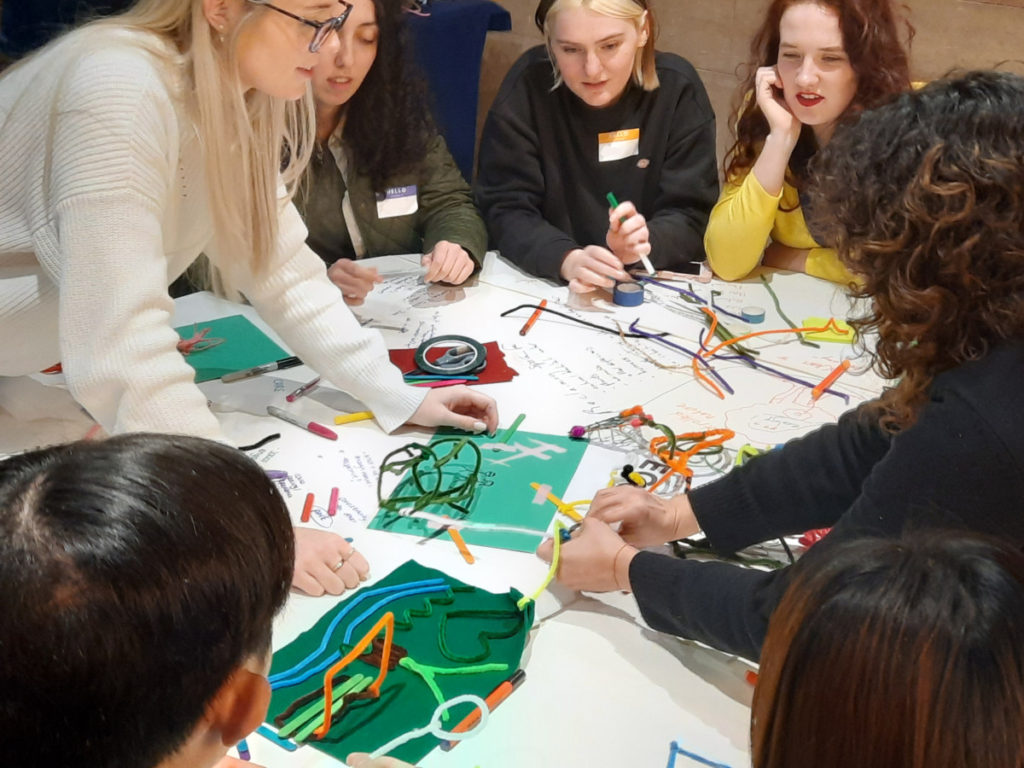Written by:
On Wednesday 22 February, we continued our WEdesign event series with our first in-person event in Newcastle, in partnership with students and tutors from University of Newcastle. We were kindly hosted by Newcastle City Council in the impressive Banqueting Hall at The Civic Centre.
The whole Glass-House team made the journey up to Newcastle, and we all really enjoyed the return of fully in-person WEdesign events. The event was well attended by a good mix of participants including individuals from public practice, education, local authority and community organisations. This led to some really thought-provoking and interesting discussions and some fantastic creative responses in our groups.
Our theme for the evening was REvalue. We were interested in exploring the value we attribute to places (be it financial, cultural, historical, environmental) and the role it plays in our relationship with the built and natural world around us. How is this informed by our shared values and value systems? Do we need to look at place through a new lens and both reevaluate and revalue the elements that make it up? Through co-design activities and much discussion, we set out to challenge the status quo and to revalue places, people and collaborative design and placemaking.
A collaboration with Newcastle University
Over the past few weeks, we have been collaborating with Armelle Tardiveau and her 3rd year students from Newcastle University’s School of Architecture, Landscape and Planning to co-design this event. The students from the university’s innovative Architecture and Urban Planning degree course are currently taking a module called Co-producing Space. So this really connected well with our WEdesign programme and the theme of Revalue and how we attribute value to our places, and how this affects our relationship with the built and natural work around us.
Interactive activity
When participants arrived, they were encouraged to take part in an interactive activity which was devised by the students. Based on Clayton Street in Newcastle, the students created an interactive map and asked participants to give their thoughts and opinions about what this location meant to them, through adding comments and creating elements from pipe cleaners to add to the map.
This was an excellent way to warm up. It got the participants thinking and gave them a good introduction to the students’ work.

Co-design propositions for change
Following our familiar WEdesign approach, we split participants up into four groups. Each group then explored the event theme of REvalue, using four different lens which included: Education, Policy, Ecology and Community. Each group was facilitated by our students, who guided the participants and encouraged the discussion through a series of prompt questions with the aim of co-designing propositions for how we might do things differently. Each group illustrated their discussion through the creation of 2D and 3D models using a range of craft materials. We then brought all the groups back together to share their key points and ideas from each discussion, and to draw together common ideas and themes from the evening.
Education

Led by Jordan and Eddie, the Education group explored creating a new education system as they felt that in the traditional design/architecture/planning education system, you have to decide what you want to specialise in too quickly and early in your education. The group felt that students need longer to mature and that being boxed in too early was detrimental to their learning journey.
The group discussed creating an education process which guides individuals and doesn’t set up permanent “roles for life” or keep people in boxes. They proposed a new system which allowed a period of time for people to experience lots of different strands and elements of the built environment, or indeed any field, that a period of time to explore and experiment would enable individuals to come out the other side more sure of what they want to do.
They also suggested that exploring a range of facets or specialisms within the built environment as part of this system would help professionals relate to all of them, and to each other’s complementary roles better.
Practice

The Practice group, facilitated by Betul and Quanah, established quickly that they wanted to move away from the word ‘practice’ in favour of ‘practising’ or ‘practical’. As one of them put it, “We are practising, we never stop learning, we are connected.” and the continuity of learning and evolving as practitioners was a key theme for them.
They were also concerned that the word ‘practice’ puts people in boxes and like the education group, they thought this was limiting and led to stereotyping people and roles. The practice of the future should focus on the fact that everyone brings something different and that we need tolerance and understanding in order to work together and to blur the boundaries of the boxes we find ourselves in.
They also found that the notion of practice seems to evoke stress for some people. Indeed, many participants stated that they had attended the Revalue event to get away from the stress at work, that they wanted to do something different.
Continuing to explore what the ‘practice of the future’ would look like, they championed a less stressful and more fulfilling environment, with more interaction with different people. They craved a lot less sitting at computers in isolation and more engaging with people and communities.
Community

Doug and Mo facilitated the community table and they began with a discussion about the definition of the word community. It quickly became clear that the word has different meanings for different people and that any community is made up of such diverse elements.
The group spoke a lot about the importance of creating spaces for connection, and proposed the idea of having a ‘picnic’, where everyone is invited and encouraged to contribute. Their analogy of a picnic was about creating spaces that are open and inclusive to everyone and where the communities involved should feel like they have ownership, can contribute, express themselves and feel valued.
Their model included a large tree to symbolise a sheltered place to have the picnic, with the edges of the model ripped to show that it was not bound by any walls, all encompassing. They also created a ‘bridge’ to help join people together and forge new connections.
Ecology

The ecology group, which was led by Amelia and Liva started by considering how to change people’s perspective on ecology, to make it fun and accessible.
The group explored what effect it would have on our relationship with our natural environment if we saw things from nature’s point of view, asking what would happen if we saw nature as equal to us. The model they created showed the connectedness between humans and nature and illustrated how we should ‘switch perspectives’.
They also talked about the value of bringing a sense of awe back into our relationship with nature, and that we should put down our screens and go outside and look at what is around us. Taking that time to really look and rediscover beauty and joy in our natural environment. This would help us value ecology, but also contribute to our health and wellbeing.
Crossing over with the lens at their neighbouring table, they stressed that ecology needs to be top priority in practice!
Summary
In the rich discussion that followed, there were some key themes and common threads which emerged:
- We should avoid putting people and ourselves in boxes. We need both more transparency and blurring of lines and to start breaking down the existing barriers.
- Let’s value the unfinished and the experimental, and remember that we are always learning and evolving. This will benefit us all and help us learn from each other.
- We need to find the time to switch perspectives and look through the eyes of someone else or of nature. This is both about building empathy and about recognising the value that each of us, and nature, has to offer.
- We need to come away from screens and take some time to look up and around us. We should not only value, but be in awe of nature, and find joy in connecting and collaborating with it.
As well as being a great event with inspiring discussion, it was also a valuable opportunity for our students to gain confidence in engaging and working with different people and enabled them to develop their own voices and facilitation skills whilst exploring the theme of Revalue.

We would like to thank all the participants in Newcastle who attended and offered their time, thoughts and generous contributions.
We would also like to thank Noor and Claire from Newcastle City Council who kindly hosted us at the Civic Centre, which provided a beautiful backdrop for this event.


